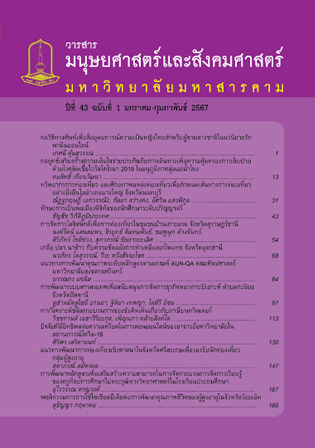Digital Citizenship Skills of Undergraduate Students
Main Article Content
Abstract
The aims of this research were to study the digital citizenship skills of undergraduate students and to examine the factors affecting their digital citizenship skills. Data were collected in semester 2/2022 using a questionnaire, for which the IOC was 0.66-1.00, and Cronbach’s Alpha coefficient was 0.972. The sample group comprised 142 undergraduate students selected with the proportional stratified sampling method. The G*Power Program was utilized to calculate the size of the sample group. Mean, standard deviation, and multiple regression analysis with the stepwise method were used to analyze the collected data. The research results illustrated that the overall digital citizenship skills of undergraduate students were at a high level ( x̅= 3.75, SD =.66). When considered by aspect, analytical thinking was at the highest level ( was at the lowest level ( x̅= 3.97, SD =.77), whereas personal information protection x̅= 3.60, SD =.76). In addition, the factors affecting the digital citizenship skills of undergraduate students with a statistical significance of 0.05 included attitudes toward ship skills of undergraduate students at 58.1%. The prediction equation was the internet and social media (X4 ), perceived self-efficacy with regard to computers and the in ternet (X3 ), and learning achievement (X2 ). All three of these factors predicted the digital citizen x̅=.478 +.383(X4 ) +.346(X3 ) +.142(X2 ).
Article Details
References
กัลยา วานิชย์บัญชา. (2561). สถิติสำ หรับงานวิจัย (พิมพ์ครั้งที่ 12). หจก.สามลดา.
ชุติมา สัจจานันท์. (2564). หน่วยที่ 4 ความฉลาดรู้เรื่องสารสนเทศ สื่อและดิจิทัล. เอกสารการสอนชุดวิชาทักษะชีวิต หน่วยที่ 1-7. สำ นักพิมพ์มหาวิทยาลัย
สุโขทัยธรรมาธิราช.
เชษฐภูมิ วรรณไพศาล. (2562). เครื่องมือการวิจัยทางสังคมศึกษา (พิมพ์ครั้งที่ 3). ศูนย์บริหารงานวิจัยมหาวิทยาลัยเชียงใหม่.
ณัฐทิตา โรจนประศาสน์ และประเสริฐ ทองหนูนุ้ย. (2557). การวิเคราะห์ข้อมูลทางสถิติเพื่อการจัดการทรัพยากรชายฝั่ง. โอเดียนสโตร์.
ทวนทอง เชาวกีรติพงศ์ และสมชัย วงษ์นายะ. (2563). แนวทางการพัฒนาความเป็นพลเมืองดิจิทัลของนักศึกษาครุศาสตร์ มหาวิทยาลัยราชภัฏกำ แพงเพชร. สัก
ทอง: วารสารมนุษยศาสตร์และสังคมศาสตร์, 26(4), 72-85.
ธัญธัช วิภัติภูมิประเทศ. (2556). ความเป็นพลเมืองในระบอบประชาธิปไตยของนักศึกษามหาวิทยาลัยธุรกิจบัณฑิตย์. มหาวิทยาลัยธุรกิจบัณฑิตย์.
ธัญธัช วิภัติภูมิประเทศ. (2562). สังคมวิทยาดิจิทัล: แนวคิดและการนำ ไปใช้. วารสารราชภัฏสุราษฎร์ธานี,6(1), 43-55.
ธัญธัช วิภัติภูมิประเทศ. (2564). เจตคติต่อความเป็นพลเมืองในระบอบประชาธิปไตยของนักศึกษาสถาบันเทคโนโลยีปทุมวัน.วารสารสันติศึกษาปริทรรศน์ มจร,
(3), 908-923.
นิพิฐพนธ์ สนิทเหลือ, วัชรีพร สาตร์เพ็ชร์, และญาดา นภาอารักษ์. (2562). การคำนวณขนาดตัวอย่างด้วยโปรแกรมสำ เร็จรูป G*Power. วารสารวิชาการสถาบัน
เทคโนโลยีแห่งสุวรรณภูมิ (สาขามนุษยศาสตร์และสังคมศาสตร์), 5(1), 496-507.
รินทร์ลภัส เกตุวีระพงศ์. (2564). พฤติกรรมการใช้สื่อสังคมออนไลน์ การรู้เท่าทันสื่อ และการตระหนักรู้การกลั่นแกล้งกันบนโลกออนไลน์ของเยาวชนในจังหวัด
เชียงใหม่. พิฆเนศวร์สาร, 17(2),143-160.
ฤทธิ์ติยา ธรรมสวาสดิ์. (2564). ปัจจัยเชิงสาเหตุพหุระดับที่ส่งผลต่อความเป็นพลเมืองดิจิทัลของนักเรียนชั้นมัธยมศึกษาตอนต้น จังหวัดมุกดาหาร [วิทยานิพนธ์
ปริญญาการศึกษามหาบัณฑิตมหาวิทยาลัยมหาสารคาม].
วลัญชพร ทุ่งสงค์ และลักขณา สริวัฒน์. (2562). การศึกษาความฉลาดทางดิจิทัลในระดับความเป็นพลเมืองดิจิทัลของนักเรียนชั้นมัธยมศึกษาตอนต้น โรงเรียน
สารคามพิทยาคม อำเภอเมืองจังหวัดมหาสารคาม. วารสารการบริหารและนิเทศการศึกษา มหาวิทยาลัยมหาสารคาม,10(3), 19-34.
ศรีดา ตันทะอธิพานิช. (2563). การสำ รวจสถานการณ์เด็กไทยกับภัยออนไลน์ 2563. มูลนิธิอินเทอร์เน็ตร่วมพัฒนาไทย.
ศศิประภา เอี่ยมภูมิ. (2563). การพัฒนาแบบวัดความเป็นพลเมืองดิจิทัลสำหรับนักเรียนระดับชั้นมัธยมศึกษาตอนปลาย [วิทยานิพนธ์ปริญญาการศึกษามหาบัณฑิต
มหาวิทยาลัยศรีนครินทรวิโรฒ].
สำนักงานพัฒนาธุรกรรมทางอิเล็กทรอนิกส์ กระทรวงดิจิทัลเพื่อเศรษฐกิจและสังคม. (2564). ผลสำรวจพฤติกรรมผู้ใช้อินเทอร์เน็ตในประเทศไทย ปี 2564. https://www.etda.or.th/th/pr-news/ETDA-released-IUB-2021.aspx
สุมน อยู่สิน. (2563). หน่วยที่ 12 อิทธิพลและผลกระทบของสื่อมวลชน. เอกสารการสอนชุดวิชาความรู้เบื้องต้นเกี่ยวกับสื่อมวลชน หน่วยที่ 8-15. สำนักพิมพ์
มหาวิทยาลัยสุโขทัยธรรมาธิราช.เสนีย์ คำสุข. (2564). หน่วยที่ 14 คุณธรรม จริยธรรม มารยาทและความรู้ด้านความเป็นพลเมือง. เอกสารการสอนชุดวิชาทักษะ
ชีวิต หน่วยที่ 8-15. สำ นักพิมพ์มหาวิทยาลัยสุโขทัยธรรมาธิราช.
Al-Zahranu, A. (2015). Toward digital citizenship: Examining factors affecting participation and involvement in the internet society
among higher education students. International Education Studies, 8(12), 203-217.
Feldman, R. S. (2015). Understanding psychology (12th Edition). McGraw-Hill Education.
Giddens, A. & Sutton, P. W. (2021). Sociology (9th Edition). Polity Press.
Ke, D. & Xu, S. (2017). A research on factors affecting college students’ digital citizenship. In
L., Juhong, N., Shoji, Z., Hai, & J. Qun (Eds.) The Sixth International Conference on
Educational Innovation through Technology (EITT) (pp. 61-64). https://ieeexplore.ieee.org/document/8308508
Mahadir, N. B., Baharudin, N. H., & Ibrahim, N. N. (2021). Digital citizenship skills among undergraduate students in Malaysia: A
preliminary study. International Journal of Evaluation and Research in Education, 10(3), 835-844.
Morduchowicz, R. (2020). Digital citizenship as a public policy in education in Latin America. UNESCO.
Tan, M. M., Park, J., Patravanich, S., & Cheong, J. (2015). Fostering digital citizenship through safe and responsible use of ICT. UNESCO.


